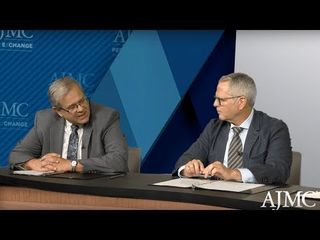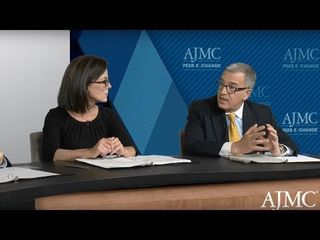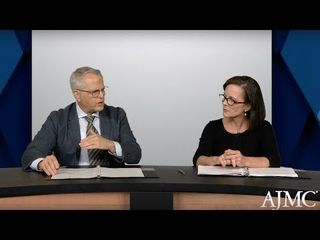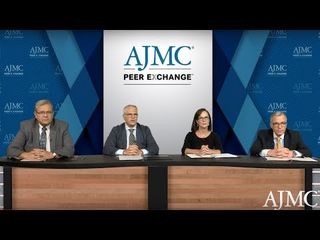
Oncology
Latest News

Latest Videos

CME Content
More News

A survey of patients in the United Kingdom who were diagnosed with cancer found that patients with blood cancers were the least likely to say they completely understood what was wrong when the doctor explained it. They were also less likely to say that their treatment options were explained before treatment started compared with patients with other cancers.

The expansion of Medicaid may mitigate health disparities in cancer diagnosis, according to a recent study that found state variation in reductions in the percentage of uninsured patients aged 18 to 64 years diagnosed with cancer. The researchers said that the results have implications for future disparities in state mortality rates, because health insurance coverage is linked to the ability to have better treatment and survival after diagnosis.

As cure rates for young patients with Hodgkin lymphoma (HL) improve, the historically negative impact of treatments has to be considered. However, a new study has found that over time, childbearing rates for female survivors of HL have improved to the point of approaching the rates of the general population.

Podcast: This Week in Managed Care—Patient-Reported Outcomes With CAR T and Other Health News
Every week, The American Journal of Managed Care® recaps the top managed care news of the week, and you can now listen to it on our podcast, Managed Care Cast.

A recent study at Johns Hopkins Bloomberg-Kimmel Institute for Cancer Immunotherapy discovered a new way to use bioinformatics to determine how a patient’s immune system responds to immunotherapy.

This week, the top managed care news included a panel mostly endorsed the use of patient-reported outcomes for coverage of chimeric antigen receptor T-cell therapy; the US Preventive Services Task Force released new recommendations for cervical cancer screening; research found accountable care organization penetration may be changing how physicians work.

Earlier this month, the National Comprehensive Cancer Network (NCCN) released new treatment guidelines for a group of rare cancers that impact women during pregnancy.

Sister publication American Journal of Managed Care® will also be a part of this collaboration.

A blood test that tracks the rise and fall of circulating tumor DNA (ctDNA) levels can predict how patients with diffuse large B-cell lymphoma will respond to therapy within days of starting treatment.

Younger, premenopausal patients with breast cancer can have unique issues that providers need to keep in mind, said Denalee O’Malley, PhD, LSW, instructor, Department of Family Medicine and Community Health, Rutgers Robert Wood Johnson Medical School.

A letter from our Editor-in-Chief, Joseph Alvarnas, MD.

Leaders at Florida Cancer Specialists discuss the cancer survivorship program they've created to meet the needs of their diverse population of patients.





The first chimeric antigen receptor (CAR) T-cell therapy was approved just a year ago, changing the face of treatment for certain types of leukemias and lymphomas but carrying with it the downsides of toxicity and cost. A year later, scientists from a major cancer center said that they’ve made headway to discovering more about the T-cell signaling patterns and that understanding more about the biological pathways could help design the next generation of CAR-T treatments.

Payment reform efforts that don't engage patients are missing out on an opportunity for greater improvements, especially in cancer, where patients face substantial cost sharing.

Providing patient-centered comprehensive care to long-term cancer survivors may lead to reduced total healthcare expenditures. Check out our website’s new table/figure pop-up feature! Click on the name of a table or figure in the text to see it in your browser.

Next week, a CMS committee will hold a day-long meeting to discuss a national coverage determination (NCD) for chimeric antigen receptor (CAR) T-cell immunotherapies, and in Thursday’s New England Journal of Medicine, Peter B. Bach, MD, MAPP, reviewed several strategies open to CMS as it continues to try to determine how to pay for CAR T.

A recent study found that the poly (ADP-ribose) polymerase (PARP) inhibitor talazoparib extended progression-free survival (PFS) and improved quality of life over chemotherapies for patients with metastatic human epidermal growth factor 2-negative breast cancer and mutations in the BRCA 1/2 genes.

A new technology platform utilizing artificial intelligence (AI) could change how drug combinations are designed and help doctors to identify optimal personalized drug combinations for patients with multiple myeloma.

The Samfund conducted a preliminary investigation into the impact of the Affordable Care Act on young adult cancer survivors’ medical cost burden and access to health care.

For insights on this issue, Evidence-Based Oncology™ spoke with Lynda Kwon Beaupin, MD, a pediatric hematologist-oncologist who recently became the director of CanSurvive, the pediatric cancer survivorship program at Johns Hopkins All Children’s Hospital in St. Petersburg, Florida. Beaupin and her colleagues in the Consortium of Adolescent and Young Adult Cancer Centers, which includes oncologists from major cancer centers including Johns Hopkins, are working to address the nuances that come with treating adolescent and young adult cancer patients and looking for ways to increase their quality of life.

Thea Danze lights up the room wherever she goes; she loves space and music and fire trucks. Since 2012, she has been the namesake and spokesperson for a foundation created to raise funds and awareness about pediatric brain tumors. Called Thea’s Star of Hope, the foundation supports development of therapies that will treat brain tumors without the toxic adverse effects that Thea has endured.
















